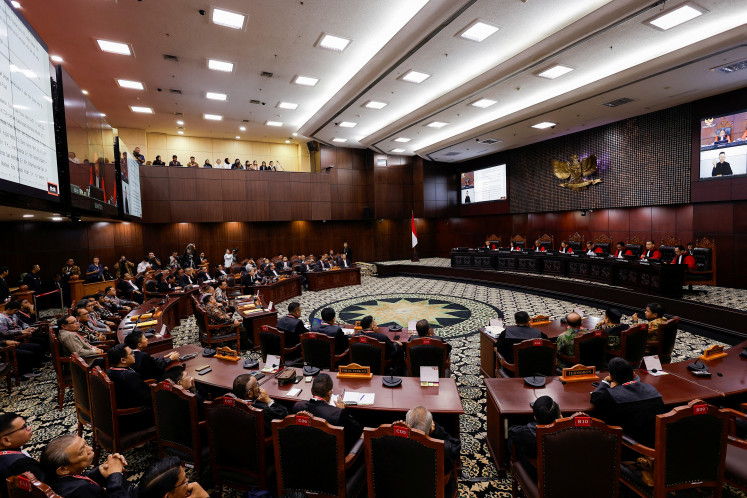Second-half Indonesian economic outlook (Part 2 of 2 )
With the legislative elections in April and the presidential vote in July ahead of the swearing-in in October, almost the entire year is without any driver in the government budget
Change Size

W
ith the legislative elections in April and the presidential vote in July ahead of the swearing-in in October, almost the entire year is without any driver in the government budget.
The next government will formally start discussing with the new parliament early in 2015 to implement whatever changes it wants. Hence the 2014 budget with the costly fuel subsidy is here to stay.
When the government raised fuel prices in July last year, expectations were high that it would reduce the costly fuel subsidy for some time. The government also proposed to limit the amount of subsidies in the budget, which means an automatic rise in fuel prices when the need arises.
But the rise in oil prices this year, the weakening of the rupiah and the continued rise in demand for subsidized energy has erased the early gains and the amount for 2014 is a staggering Rp 350 trillion (US$30.15 billion), of which Rp 246 trillion will be for fuel and Rp 104 trillion for electricity.
This is equivalent to 21 percent of total government revenue or 15 percent of total expenditure and constitutes the largest single expenditure item, almost triple the central government's expenditure on
education.
At 3.5 percent of gross domestic product (GDP), energy subsidies are also hugely wasteful expenditure that can and should be reallocated to more productive uses such as building infrastructure.
The next government would be well advised to phase down energy subsidies. One example is to limit the amount of subsidies to a successively smaller amount in three'five years.
The gradual approach makes economic sense as it does not shock consumers and avoids undue pressure on inflation. The gradual approach also makes sense from a political perspective.
Another urgent agenda item is to reform the tax administration. In the past few years tax revenue has fallen short of its target. The blame usually goes to the slowing down of the commodity-exporting sectors on account of global price declines. This affects revenue from reductions in corporate income taxes and export levies.
Given the global situation and with a new administration only set to take office in October, we can see the first-half trends continuing into the second half of this year.
First is that exports in terms of prices and volumes will remain volatile with a tendency to remain weak in the 2H14. Development in China is still unsettled, and signs of renewed strength are not yet forming a trend.
And the same is also true in Europe. Moreover, one of the largest banks in Portugal recently missed a payment on its debt, sending the Portuguese sovereign bond yield down by 20 basis points, and contagion also affected Greek, Spanish and Italian debt. It appears that the European banking sector is not yet out of trouble. That also negatively affects sentiment in the already fragile growth across the continent.
The US economy is also showing signs its employment recovery is not translating into a significant boost in GDP growth. The upshot for a commodity exporter like Indonesia is clear: volatility with a downward bias is the risk going forward.
Second is the interest rate and exchange rate outlook. With a periled export forecast, our trade balance cannot expect a significant upward trajectory in the short term.
Add to this the continued fuel imports even as other exports like raw materials and capital goods decline on account of a slowing economy.
We will likely see the current account deficit rise to 3 percent of GDP before stabilizing. This will add pressure to the rupiah to remain weak at around 12,000 per US dollar. The recent surge in the currency on account of the peaceful elections appears to be temporary. We can, therefore, expect Bank Indonesia to continue to play it safe and, barring any big surprises, to maintain the policy rate at 7.5 percent until the end of the year.
Third, the financial market, which speculated on a Joko 'Jokowi' Widodo win, got a shot in the arm and the equity index surged for a day before profit taking stabilized it back around the 5,000 level. If Jokowi is named president we might see another weaker surge and upward momentum, although most of the election euphoria is already priced in.
Capital flow will continue to trickle into both the equity as well as government bond market.
And lastly, GDP growth will likely continue its decline to end up at 5.3 percent for the whole of 2014 with a downside risk but still likely to be above 5 percent. The decline in bank credit growth to 17.4 percent year-on-year in May from 18.5 percent in April is another sign of moderation in economic growth.
Big hopes are pinned on early 2015. One key agenda for whoever becomes president is the phasing out of fuel subsidies, while another is revamping infrastructure growth, and generally improving the investment climate.
These are policies that will bear fruit in the medium term. But a significant push and credible start would be enough to raise expectations, which could turn into a virtuous cycle. The positive impact on sentiments in the financial market would be a bonus.
_________________________
The writer teaches at the University of Indonesia's school of economics, Jakarta.









